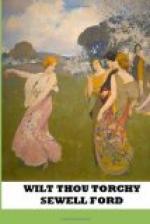Mrs. Bagstock don’t seem to be listenin’. She’s just gazin’ around smilin’ vague.
“Music, wasn’t there?” she goes on. “I had really forgotten having ordered an orchestra. And such lovely roses! Let me take one more look at the dear old drawing-room. Yes, it was a success, I’m sure. Now you may ring for my maid. I—I think I will retire.”
As they brushed past me on their way to the stairs I took a chance on whisperin’ to Tessie.
“Hadn’t you better ring up the doc?” I suggests.
“Maybe I had,” says she.
Perhaps she did, too. I expect it didn’t matter much. Only I was peeved at that boob society editor, after all the trouble I took to get the story shaped up by one of my newspaper friends and handed in early, to have it held over for the Sunday edition. That’s how it happens the paper I takes in to Mr. Ellins Monday mornin’ has these two items on the same page—I’d marked ’em both. One was a flossy account of Mrs. Theodore Bayly Bagstock’s third Wednesday; the other was six lines in the obituary column. Old Hickory reads ’em, and then sits for a minute, gazin’ over the top of his desk at nothing at all.
“Poor Natalie!” says be, after a while. “So that was her last.”
“Nobody ever finished any happier, though,” says I.
“Hah!” says he. “Then perhaps that balances the account.”
Saying which, he clips the end off of a fat black perfecto, lights up, and tackles the mornin’ mail.
CHAPTER VII
TORCHY FOLLOWS A HUNCH
It was a case of local thunderstorms on the seventeenth floor of the Corrugated Trust Building. To state it simpler, Old Hickory was runnin’ a neck temperature of 210 or so, and there was no tellin’ what minute he might fuse a collar-button or blow out a cylinder-head.
The trouble seemed to be that one of his pet schemes was in danger of being ditched. Some kind of an electric power distributin’ stunt it is, one that he’d doped out durin’ a Western trip last summer; just a little by-play with a few hundred square miles of real estate, includin’ the buildin’ of twenty or thirty miles of trolley and plantin’ a few factories here and there.
But now here’s Ballinger, our Western manager, in on the carpet, tryin’ to explain why it can’t be done. He’s been at it for two hours, helped out by a big consultin’ engineer and the chief attorney of our Chicago branch. They’ve waved blue-print maps, submitted reports of experts, and put in all kinds of evidence to show that the scheme has either got to be revised radical or else chucked.
“Very sorry, Mr. Ellins,” says Ballinger, “but we have done our best.”
“Bah!” snaps Old Hickory. “It’s all waste land, isn’t it? Of course he’ll sell. Who is he, anyway?”
“His name,” says Ballinger, pawin’ over some letters, “is T. Waldo Pettigrew. Lives in New York, I believe; at least, his attorneys are here. And this is all we have been able to get out of them—a flat no.” And he slides an envelope across the mahogany table.




